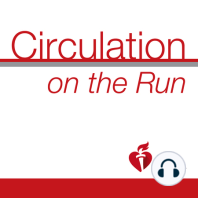23 min listen
Circulation May 16, 2017 Issue
ratings:
Length:
20 minutes
Released:
May 15, 2017
Format:
Podcast episode
Description
Dr. Carolyn Lam: Welcome to Circulation on the Run, your weekly podcast summary and backstage pass to the journal and its editors. I'm Dr. Carlolyn Lam, associate editor from the National Heart Center, and Duke National University of Singapore. What's the link between DPP4 and aortic valve calcification? Well, to find out, keep listening because we'll be discussing this and an important new paper right after these summaries. The first original paper in this issue tells us that high sensitivity Troponin I, may have a role in personalizing preventive strategies in patients with Type II Diabetes. Dr. Cavender and colleagues from University of North Carolina, Chapel Hill, sought to describe the relationship between changes in high sensitivity Troponin I and cardiovascular outcomes in the EXAMINE phase 3B trial, which was designed to evaluate the cardiovascular safety of alogliptin. The current analysis was restricted to patients, randomized 30 days or more after the qualifying acute coronary syndrome event, and high sensitivity Troponin I was measured using the Abbot Architect Assay at baseline and six months. The authors found that high sensitivity Troponin I was detectable in the vast majority - 93% of patients with Type II Diabetes, stabilized within 30 days after acute coronary syndrome. One in six of these patients had high sensitivity Troponin I levels above the 99th percentile upper reference limit. High sensitivity Troponin I had a strong graded relationship with the incidence of subsequent major cardiovascular events. Changes in high sensitivity Troponin I as small as two to six nanograms per liter over six months, were associated with a heightened risk of adverse outcomes. Particularly cardiovascular death and heart failure. Alogliptin neither increased nor decreased the risk of cardiovascular events in a high risk cohort of patients with elevated high sensitivity Troponin I levels. These findings therefore imply that serial measurements of high sensitivity Troponin may have a role in preventive strategies, either by intensifying or prolonging therapies in patients at high risk or reducing or shortening therapies in patients at low risk of cardiovascular events. The next paper describes the effects of Pioglitazone on cardiac outcomes after ischemic stroke or transient ischemic attack in patients with insulin resistance without diabetes in the IRIS trial, which stands for Insulin Resistance Intervention after Stroke. As a reminder, the IRIS trial compared the effects of Pioglitazone with placebo on major cardiovascular events after stroke or transient ischemic attack, in patients without diabetes but who had evidence of insulin resistance. And it showed that Pioglitazone improved insulin resistance, prevented diabetes, improved CRP and reduced fatal and non-fatal stroke or myocardial infarction. In the current paper, by Dr. Young and colleagues from Yale Cardiovascular Research Center in New Haven, Connecticut, the authors performed a secondary analysis of IRIS and examined the effect of Pioglitazone on acute coronary syndromes, mainly myocardial infarction or unstable angina. They found that Pioglitazone reduced the risk of these events by 29%, with benefit emerging after two years of treatment. Furthermore, Pioglitazone reduced the incidence of Type I myocardial infarction with a neutral effect on Type II myocardial infarction. In summary, among patients with insulin resistance without diabetes, Pioglitazone reduced the risk of acute coronary syndromes after a recent cerebrovascular event, and may serve as a useful secondary prevention therapy in addition to statins, aspirin, and other established treatments. The next study tells us that immune complexes may be an important biomarker in the risk stratification o
Released:
May 15, 2017
Format:
Podcast episode
Titles in the series (100)
Circulation September 19, 2017 Issue: Circulation Weekly: Your Weekly Summary & Backstage Pass To The Journal by Circulation on the Run
